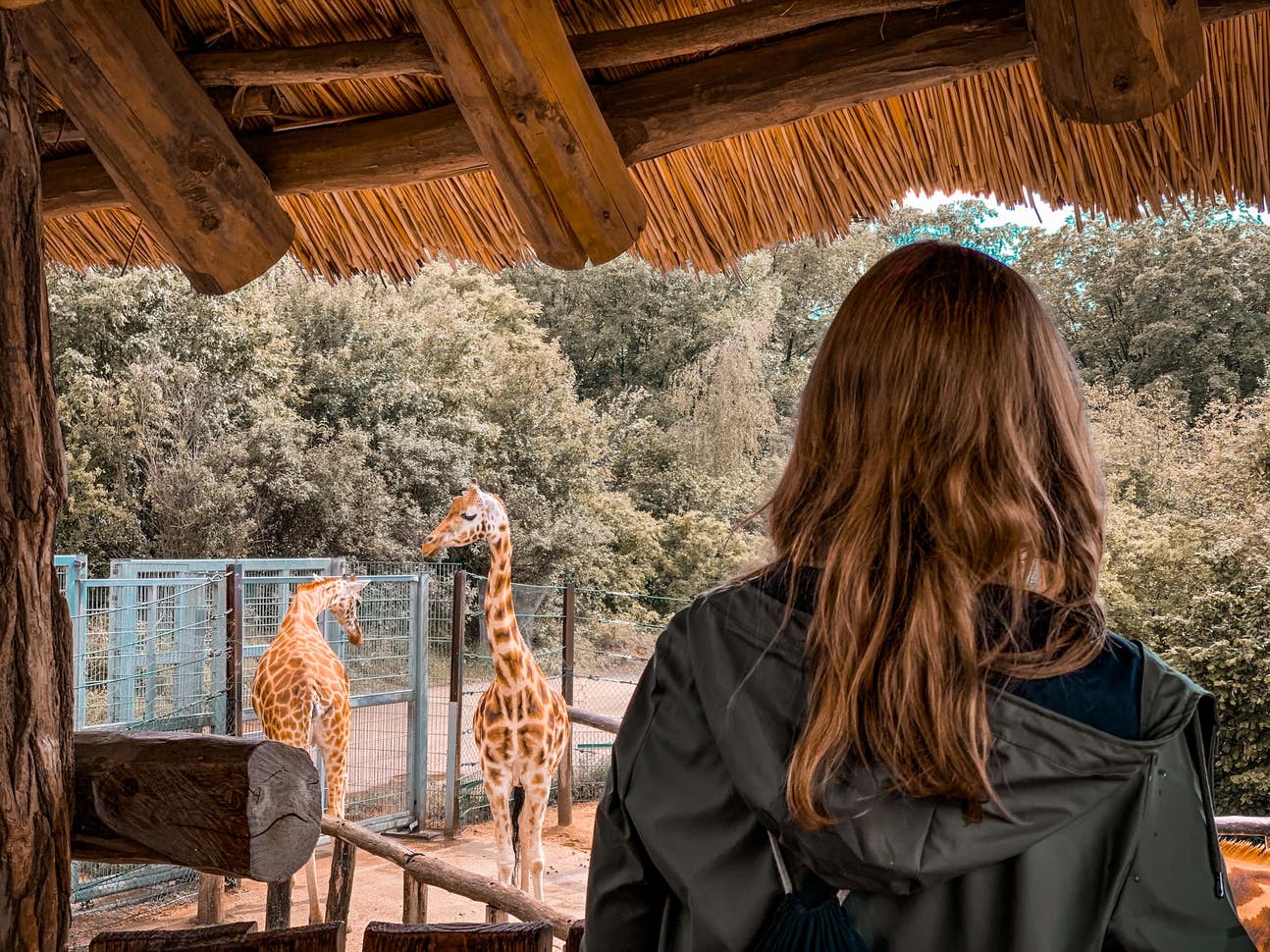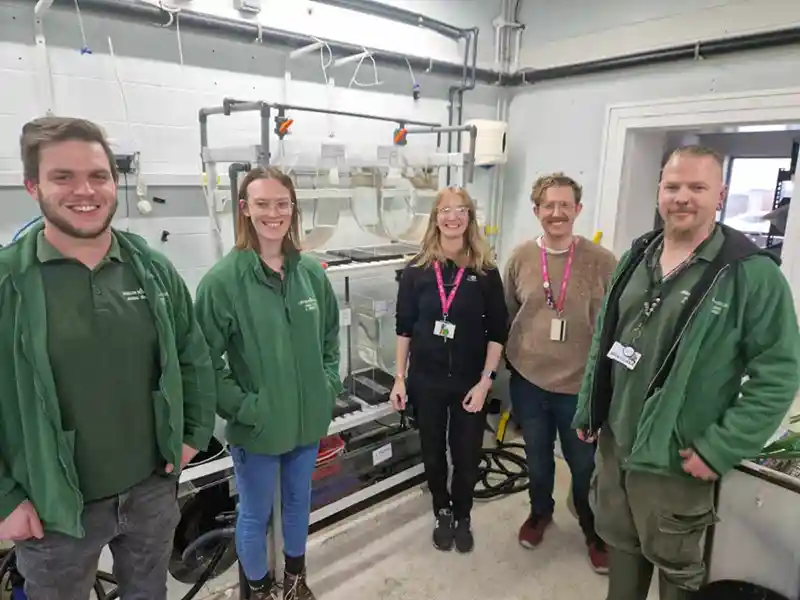Do you enjoy animals and imagine operating in a zoo? Zoo keepers are type in safeguarding wildlife and taking care of animals. At places like the Zoological Society of London (ZSL), over 20,000 animals get the care they need from professionals.

To become a zoo keeper, you require hard work, education, and a love for animals. This job is interesting, zookeeper letting you work with numerous species and aid with important preservation work. If you’re into wildlife or animal welfare, zookeeping might be ideal for you.
Starting your zoo keeper career indicates learning what’s needed. This guide will cover education, experience, and more. It’s all you need to understand to start a satisfying zookeeping profession.
Understanding the Role of a Zookeeper
Exploring what a zookeeper does exposes a function filled with difficulties and rewards. They focus on animal welfare and preservation. Zookeepers work hard to keep animals healthy and happy in their care.
Daily Responsibilities and Tasks
A zookeeper‘s day is filled with essential tasks:
- Preparing meals that meet each animal’s nutritional requirements
- Cleaning up enclosures to keep them clean and safe
- Supervising animal health and behaviour
- Providing medications and treatments as needed
- Creating activities to keep animals psychologically sharp
Workplace and Conditions
Zookeepers work outside in all sort of weather condition. They handle both indoor and outdoor spaces. The task requires being physically fit and able to manage the needs of looking after animals.
“Being a zookeeper is more than a job – it’s an enthusiastic dedication to animal care and conservation.”
Types of Animals and Specialisations
Zookeepers can specialise in many animal groups:
- Primates
- Big cats
- Marine mammals
- Reptiles
- Birds
Your role might include working with 2-5 different animal species. This requires a great deal of knowledge and the ability to adjust.
Vital Skills and Personal Qualities for Zoo Keeping
To be a top zookeeper, you need more than simply a love for animals. Your job will be tough and require you to handle animals and individuals well. You’ll likewise need to understand animal behaviour.
What zoos look for in individuals includes:
- Exceptional patience and emotional resilience
- Strong physical conditioning and endurance
- Keen observation skills
- Capability to stay calm under pressure
- High level of compassion towards animals
Getting hands-on experience is key to mastering this function. You’ll require to show:
- Advanced understanding of animal care methods
- Efficiency in animal handling and security protocols
- Effective communication with both animals and human visitors
“A fantastic zookeeper links science, empathy, and preservation in every interaction with animals.”
You need to learn about animal nutrition, behaviour, and standard vet care. The majority of zookeepers learn through training, volunteering, and continuous knowing.
Zookeeper work is not simply a job. It’s a big commitment to teaching about wildlife and assisting preservation. Your passion and effort will make you stick out in this fulfilling career.
How to Become a Zoo Keeper
Beginning a profession as a zookeeper requires careful preparation and education. You need to first understand the educational needs and training paths. These will turn your love for animals into a task.
Educational Requirements
To be an excellent zookeeper, you need a strong academic base. Most jobs try to find particular credentials:
- At least 5 GCSEs at grade 4 or above, including English, mathematics, and science
- A levels or college certifications
- A college degree in biology or animal science
- Level 3 Diploma in Animal Management
Required Certifications
Getting special accreditations can really help you in your zookeeper career. Important ones consist of:
- Diploma in Management of Zoo and Aquarium Animals (DMZAA)
- Zookeeping Level 3 Diploma (RQF)
- Animal managing certificates
- First aid qualifications
Training Programs and Apprenticeships
Getting hands-on experience is key in zookeeper training. Numerous locations use terrific opportunities:
- Unpaid apprenticeships at wildlife parks
- Internship programmes at widely known zoos
- Practical training at places like Colchester Zoo and Dartmoor Zoo
- Volunteering to acquire real-world skills
Pro tip: Create a comprehensive portfolio to show your animal care skills. It will assist you in task applications.
Building Relevant Experience in Animal Care
Getting hands-on experience is essential for those wanting to be zookeepers. The job is extremely competitive. So, it’s crucial to start constructing a strong base in animal care.
Your journey starts with discovering ways to work directly with animals. This is a strategic action.
“Experience is the best teacher in animal care” – Wildlife Conservation Experts
Here are effective methods to get experience working with animals:
- Volunteer at regional animal shelters to establish standard animal handling abilities
- Look for zookeeper internships at wildlife rehabilitation centres
- Explore part-time positions at veterinary clinics
- Contact your local zoo for zookeeper possible volunteer chances
Volunteering is a great way to learn about animal behaviour and care. Many zoos and animal shelters are trying to find people who want to learn. These places offer excellent chances to get hands-on experience and show your devotion to animal welfare.
Here are some suggestions to make the most of your experience:
- Keep a record of your skills and interactions
- Connect with experts in animal care
- Request for referrals and recommendation letters
- Stay consistent and reveal your real enthusiasm
Remember, practical experience makes you stand apart in the zookeeping world. Whenever you deal with animals, you find out more. This increases your chances of getting a job in animal care.
Profession Pathways and Professional Development
Beginning a career as a zookeeper is interesting. It offers lots of chances to grow and specialise. Your journey begins with comprehending the various paths in this field.
Entry-Level Positions
Entry-level tasks in zookeeping are a terrific start. They provide you hands-on experience. Zoos search for candidates with:
- Level 2 Diploma in Animal Care (minimum credentials)
- GCSEs in English and a clinical topic
- Volunteer experience at animal shelters or farms
Profession Progression Opportunities
As you gain experience, your profession can grow. You can go up to:
- Junior Keeper
- Senior Keeper
- Group Leader
- Expert Roles
“Continuous knowing and useful experience are crucial to advancing in your zookeeping profession.”
Specialised Roles
You can also choose unique areas like:
- Conservation reproducing programmes
- Animal training
- Wildlife research
- Educational outreach
About 25% of zookeepers get advanced degrees in zoology or animal preservation. Getting Level 4 certifications can increase your opportunities for senior roles and research.
Working Hours and Physical Demands
Becoming a zookeeper indicates you’ll work more than simply regular hours. You’ll deal with tough physical obstacles and need to be versatile, consisting of weekends and holidays. Zoos are open every day, so you’ll frequently work when others relax.
“Zoo keeping is not a normal 9-to-5 job– it’s a way of life of devoted animal care and dedication.”
This task is physically demanding. You’ll work outside in any weather, raising heavy products over 50 pounds. Your tasks might include:
- Early morning feeding schedules
- animal enclosures
- Preparing specialised diets
- Performing medical examination
- Preserving complex habitats
Shifts can start as early as 5 AM and go late into the night. You’ll be on your feet the majority of the time, moving in between animal zones. Weekends and holidays are part of the task, requiring lots of endurance and dedication.
Regardless of the difficulties, this job has fantastic rewards. You’ll grow strong, both physically and mentally. You’ll likewise make incredible connections with incredible animals.
Health And Wellness Considerations
Being a zookeeper includes its own set of obstacles. It’s crucial to know how to keep both animals and staff safe. This means following strict health and wellness guidelines.
Zookeepers face a distinct environment where safety is key. Research studies reveal that health and safety are now as essential as the zoo’s main work.
Danger Management Strategies
There are a number of ways to manage threats in zoos:
- Daily checks of animal enclosures for dangers
- Counting animals at the start and end of shifts
- Watching how visitors act near animals
- Being ready for emergencies
Animal Handling Safety Protocols
Understanding which animals are most unsafe is essential. Big animals like rhinos can be extremely risky. There have actually been cases where zookeepers got seriously hurt.
Security isn’t just about using equipment – it’s about understanding animal behaviour and staying alert.
Individual Protective Equipment
Zookeepers need to use the best gear, consisting of:
- Special gloves for managing animals
- Strong shoes for grip and safety
- Clothing that safeguards versus germs
Getting vaccinated against diseases like liver disease B and rabies is likewise crucial. It assists keep zookeepers healthy in their tough job.
Wage Expectations and Job Market
Considering a profession in zoo keeping? It’s essential to understand about wages and the task market. The field is growing, with more chances in the UK.
Let’s look at what zoo keepers can earn at various stages:
- Entry-level zookeepers start at about ₤ 14,000 a year
- Certified ones make in between ₤ 16,000 and ₤ 22,000
- Senior zookeepers can earn up to ₤ 30,000 or more
The task outlook for zoo keepers is excellent. The sector is expected to grow by 5% in the UK by 2029. This indicates around 3,910 brand-new jobs will be available.
“The Association of Zoos and Aquariums supports expert development for zoo keepers,” a report states.
Wages vary based on numerous things:
- Experience level
- Specialisation
- Where you work
- The zoo’s size and type
While the pay might not be high, the pleasure of dealing with animals is priceless. The average salary is around ₤ 17,000. But, overall earnings can be in between ₤ 13,000 and ₤ 27,000 a year.
Conclusion
Starting a career in animal care is an exciting journey. It requires devotion, enthusiasm, and a love for knowing. With over 350 zoos and wildlife locations in the UK, there are lots of job opportunities. You’ll get to work with remarkable animals and help safeguard wildlife.
To be a zoo keeper, you require more than simply love for animals. You need to have a mutual understanding of biology, be able to interact well, and always want to find out more. You’ll gain hands-on experience, learn more about animal welfare, and develop a deep regard for nature. About 3,000 people in the UK have actually found satisfying careers in this field.
Your success in zoo keeping comes from blending science with a love for animals. Whether you’re interested in mammals, birds, or marine life, this job lets you help with preservation. Every day will bring new obstacles and finding out chances that will enhance your skills and knowledge.
If you like animals and want to assist safeguard wildlife, zoo keeping might be for you. Take on the obstacle, remain curious, and turn your passion for animals into a fulfilling career.
Please login or Register to submit your answer









